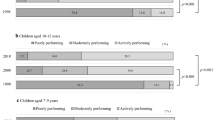Abstract
Background
There have been few studies investigating neuro-oncologists’ attitudes toward the disclosure of the diagnosis. This study aimed to determine the current status of disclosure to glioma patients in Japan and to analyze the factors associated with disclosure.
Methods
A set of questionnaires about disclosure to patients with malignant glioma was distributed by e-mail to 191 physicians participating in the 27th Annual Meeting of the Japan Society for Neuro-Oncology.
Results
The response rate was 73.8% (141/191). Of these, 44.3% disclosed the correct diagnosis to glioblastoma patients aged <60 years and 41.4% disclosed the correct diagnosis to those aged ≥70 years; for anaplastic astrocytoma patients, these proportions were 61.5 and 51.9%, respectively. Physicians working at facilities performing surgery on more than 50 cases of glioma per year, those in metropolitan areas, and those with other patient psychosocial support systems available disclosed the diagnosis and prognosis more frequently. The physicians’ gender and postgraduate period of practice did not influence disclosure. When the family opposed disclosing the diagnosis to the patient, more than half of the physicians respected the family’s wishes.
Conclusions
This survey revealed that most of the physicians told at least the malignant nature of the disease to patients with malignant glioma, but they did not always tell the exact diagnosis. Physicians tended to modify their attitudes toward disclosing a diagnosis or prognosis of glioma depending on the histopathological grading, the hospital volume of cases, the location, the availability of patient psychological support systems, and the patient’s family’s wishes.
Similar content being viewed by others
References
Oken D (1961) What to tell cancer patients. A study of medical attitudes. JAMA 175:1120–1128
Novack DH, Plumer R, Smith RL et al (1979) Changes in physicians’ attitudes toward telling the cancer patient. JAMA 241:897–900
Uchitomi Y, Yamawaki S (1997) Truth-telling practice in cancer care in Japan. Ann N Y Acad Sci 809:290–299
Horikawa N, Yamazaki T, Sagawa M et al (2000) Changes in disclosure of information to cancer patients in a general hospital in Japan. Gen Hosp Psychiatry 22:37–42
Kawakami S, Arai G, Ueda K et al (2001) Physician’s attitudes towards disclosure of cancer diagnosis to elderly patients: a report from Tokyo, Japan. Arch Gerontol Geriatr 33:29–36
Committee of Brain Tumor Registry of Japan (2009) Report of Brain Tumor Registry of Japan (1984–2000), 12th edn. Part III: result of treatments. Neurol Med Chir 49:S35–S96
McConigley R, Halkett G, Lobb E et al (2010) Caring for someone with high-grade glioma: a time of rapid change for caregivers. Palliat Med 24:473–479
Edvardsson T, Ahlstrom G (2008) Being the next of kin of a person with a low-grade glioma. Psychooncology 17:584–591
Faithfull S, Cook K, Lucas C (2005) Palliative care of patients with a primary malignant brain tumour: case review of service use and support provided. Palliat Med 19:545–550
Janda M (2006) Supportive care needs of people with brain tumours and their carers. Support Care Cancer 14:1094–1103
Narita Y, Miyakita Y, Momota H et al (2009) A survey of neurosurgeons’ policies and attitudes regarding the disclosure of a diagnosis of glioma and the decision to pursue end-of-life care in glioma patients. No Shinkei Geka 37:973–981 (in Japanese)
Elwyn TS, Fetters MD, Gorenflo W et al (1998) Cancer disclosure in Japan: historical comparisons, current practices. Soc Sci Med 46:1151–1163
Akabayashi A, Kai I, Takemura H et al (1999) Truth telling in the case of a pessimistic diagnosis in Japan. Lancet 354:1263
Davies E, Clarke C, Hopkins A (1996) Malignant cerebral glioma. II. Perspectives of patients and relatives on the value of radiotherapy. BMJ 313:1512–1516
Salander P, Bergenheim T, Henriksson R (1996) The creation of protection and hope in patients with malignant brain tumours. Soc Sci Med 42:985–996
Anderson SI, Taylor R, Whittle IR (1999) Mood disorders in patients after treatment for primary intracranial tumours. Br J Neurosurg 13:480–485
Davies E, Bannon M (1999) Opportunities for improving the quality of care in malignant cerebral glioma. J Neurol Neurosurg Psychiatry 66:693
Giovagnoli AR (1999) Quality of life in patients with stable disease after surgery, radiotherapy, and chemotherapy for malignant brain tumour. J Neurol Neurosurg Psychiatry 67:358–363
Davies E, Higginson IJ (2003) Communication, information and support for adults with malignant cerebral glioma: a systematic literature review. Support Care Cancer 11:21–29
Horikawa N, Yamazaki T, Sagawa M et al (1999) The disclosure of information to cancer patients and its relationship to their mental state in a consultation–liaison psychiatry setting in Japan. Gen Hosp Psychiatry 21:368–373
Morita S, Kobayashi M, Oba K et al (2006) Truth-telling to patients with advanced cancer: a comparison between cancer center, university hospitals, general city hospitals, and private general practitioners in Japan. Ann Cancer Res Therap 14:1–11
Seo M, Tamura K, Shijo H et al (2000) Telling the diagnosis to cancer patients in Japan: attitude and perception of patients, physicians and nurses. Palliat Med 14:105–110
Elwyn TS, Fetters MD, Sasaki H et al (2002) Responsibility and cancer disclosure in Japan. Soc Sci Med 54:281–293
Acknowledgments
The authors are indebted to all those physicians who cooperated with the questionnaire survey, and to Dr. Shin-Ichi Miyatake (Department of Neurosurgery, Osaka Medical College) for allowing the questionnaire survey to be distributed to the participants at the 27th JSNO (the Japan Society for Neuro-Oncology). The authors would also like to thank Ms. Mariko Kakinoki for her secretarial assistance.
Conflict of interest
No author has any conflict of interest.
Author information
Authors and Affiliations
Corresponding author
About this article
Cite this article
Yamamoto, F., Hashimoto, N., Kagawa, N. et al. A survey of disclosure of diagnosis to patients with glioma in Japan. Int J Clin Oncol 16, 230–237 (2011). https://doi.org/10.1007/s10147-010-0152-8
Received:
Accepted:
Published:
Issue Date:
DOI: https://doi.org/10.1007/s10147-010-0152-8




